Lesson 40
新概念英语第四册 Lesson40 课文音标版讲义
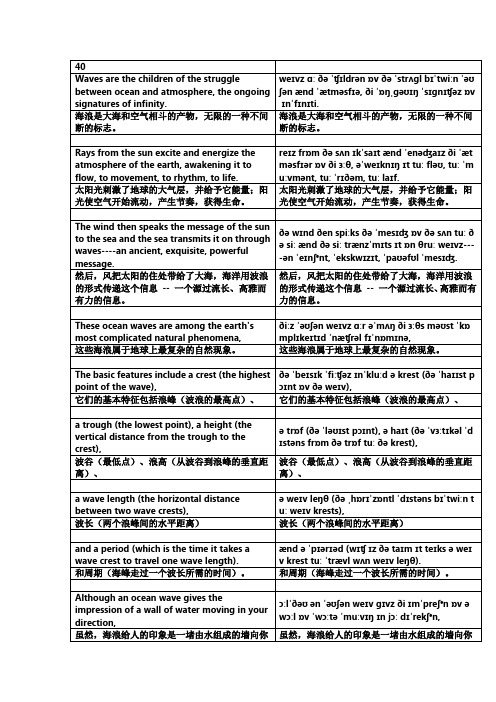
40Waves are the children of the struggle between ocean and atmosphere, the ongoing signatures of infinity. weɪvz ɑːðəˈʧɪldrənɒvðəˈstrʌɡl bɪˈtwiːnˈəʊʃən ænd ˈætməsfɪə, ði ˈɒŋˌɡəʊɪŋˈsɪɡnɪʧəzɒv ɪnˈfɪnɪti.海浪是大海和空气相斗的产物,无限的一种不间断的标志。
海浪是大海和空气相斗的产物,无限的一种不间断的标志。
Rays from the sun excite and energize the atmosphere of the earth, awakening it to flow, to movement, to rhythm, to life. reɪz frɒm ðə sʌn ɪkˈsaɪt ænd ˈenəʤaɪz ði ˈæt məsfɪər ɒv ði ɜːθ,əˈweɪknɪŋɪt tuː fləʊ, tuːˈm uːvmənt, tuːˈrɪðəm, tuː laɪf.太阳光刺激了地球的大气层,并给予它能量;阳光使空气开始流动,产生节奏,获得生命。
太阳光刺激了地球的大气层,并给予它能量;阳光使空气开始流动,产生节奏,获得生命。
The wind then speaks the message of the sun to the sea and the sea transmits it on through waves----an ancient, exquisite, powerful message. ðə wɪnd ðen spiːks ðəˈmesɪʤɒv ðə sʌn tuː ðəsiː ænd ðəsiːtrænzˈmɪts ɪt ɒn θruː weɪvz----ən ˈeɪnʃᵊnt, ˈekskwɪzɪt, ˈpaʊəfʊl ˈmesɪʤ.然后,风把太阳的住处带给了大海,海洋用波浪的形式传递这个信息-- 一个源过流长、高雅而有力的信息。
河北教育出版社七年级下册英语书lesson40课文翻译

河北教育出版社七年级下册英语书lesson40课文翻译Lesson 40 Move Your BodyVocabulary* Ben 本(男名)* Tim 蒂姆(男名)* outdoor adv.在户外weight n. 重量* couch n.睡椅,长沙发椅air n.空气,天空lucky adj.幸运的,侥幸的side n.边,侧边Text Lesson 40 Move Your Body第40课动起来Ben and Tim are good friends.本和蒂姆是好朋友。
They used to be very active together.过去他们在一起很活跃。
They walked everywhere.他们四处散步。
They played games outdoors.他们玩户外游戏。
But now Ben worries about Tim.但是现在本担心蒂姆。
Tim is not active any more.蒂姆不再活跃了。
He has some bad habits.他养成了一些坏习惯。
He watches too much TV and plays too many computer games.他总是看电视并且总是玩电脑游戏。
And he is putting on weight.他的体重一直在增加。
Ben sends his friend a poem:本给他的好朋友写了一首诗:You can be a couch potato and watch TV all day.你整天看电视,将变成一个沙发土豆。
But don't do that. There is another way!但是不要这样了。
你可以做其他的事情!Move your body, get out and have fun.动起来,到外面去,愉快地玩。
新概念英语第二册Lesson40_42课文注释

新概念英语第二册Lesson40~42课文注释新概念英语第二册Lesson40课文注释1.next to, 挨着。
它既可以表示座位挨着也可以表示地理位置上挨着:Who was the man sitting next to you during the meeting?开会时坐在你旁边的那人是谁?There's a field/shop next to our house.我们家房子边上有一片田野/一个商店。
2.Mrs. Rumbold was a large, unsmiling lady in a tight black dress.兰伯尔德夫人是一位身材高大、表情严肃的女人,穿一件紧身的黑衣服。
(1)unsmiling的反义词为smiling(微笑的,喜气洋洋的)。
有些形容词前面可以加上前缀un-来表示相反的意义:comfortable (舒服的)/uncomfortable(不舒服的),true(真实的)/untrue(不真实的), interesting(有趣的)/uninteresting(无趣味的,乏味的)。
(2)in在这里表示“穿着”、“戴着”:A young man in a blue dress is inquiring for you.有位穿蓝衣服的小伙子在找您。
3.take one's seat, 在指定的位置上就座。
take a seat表示“坐下”,比sit要正式:Please take a seat.请坐。
take one's seat则表示位置事先已安排好:After everyone had taken his seat, the meeting/dinner party began.大家各自就座后,会议/宴会便开始了。
4.Her eyes were fixed on her plate and in a short time, she was busy eating. 她的眼睛盯着自己的盘子,不一会儿就忙着吃起来了。
新概念英语第3册课程讲义Lesson40
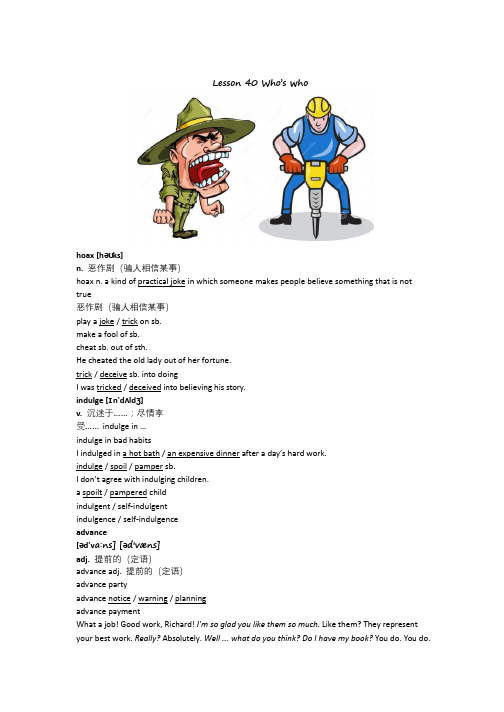
Lesson 40 Who’s whohoax [həʊks]n. 恶作剧(骗人相信某事)hoax n. a kind of practical joke in which someone makes people believe something that is not true恶作剧(骗人相信某事)play a joke / trick on sb.make a fool of sb.cheat sb. out of sth.He cheated the old lady out of her fortune.trick / deceive sb. into doingI was tricked / deceived into believing his story.indulge [ɪn'dʌldʒ]v. 沉迷于……;尽情享受…… indulge in …indulge in bad habitsI indulged in a hot bath / an expensive dinner after a day’s hard work.indulge / spoil / pamper sb.I don’t agree with indulging children.a spoilt / pampered childindulgent / self-indulgentindulgence / self-indulgenceadvance[əd'vɑ:ns] [əd'væns]adj. 提前的(定语)advance adj. 提前的(定语)advance partyadvance notice / warning / planningadvance paymentWhat a job! Good work, Richard! I'm so glad you like them so much. Like them? They represent your best work. Really? Absolutely. Well ... what do you think? Do I have my book? You do. You do.There’s a book here. I'll have a contract and an advance payment waiting for you, first thing in the morning.in advanceRent must be paid one month in advance.in advance of …Galileo’s ideas were in advance of the age in which he lived.advanced adj. 高级的, 先进的advanced technologyan elementary / intermediate / advanced English courseelementary / intermediate / advanced English learnersremonstrate ['remənstreɪt] [rɪ'mɑ:nstreɪt]v. 抗议,规劝,告诫remonstrate with sb. (fml.) 向某人抗议The coach angrily remonstrated with the referee.Shortly afterwards, four more policemen arrived and remonstrated with the workmen. demonstrate v. 展示, 表明protest against …聚众抗议……complain (to sb.) of / about sth.Several people complained of cat-like noises at night and a businessman on a fishing trip saw the puma up a tree.Almost immediately he began to complain about the weather, for even though it was still summer, it rained continually and it was often bitterly cold.nag sb. to do …When my wife nagged me to do something about it, I told her that either I would have to buy a new mower or let the grass grow.pester sb. to do …From the moment he arrived there, he kept on pestering his doctor to tell him when he would be able to go home.ironically [aɪ'rɒnɪklɪ]adv. 讽刺地ironically / sarcasticallyAt this, the police pointed out ironically that this would hardly be necessary as the men were already under arrest.'Perfume, eh?' he asked sarcastically. 'You should have declared that. Perfume is not exempt from import duty.'ironic / sarcasticI was almost there when a sarcastic voice below said, 'I don't think the windows need cleaning at this time of the night.'irony / sarcasmwith heavy irony / sarcasm'Good of you to arrive on time,' George said, with heavy irony / sarcasm.hint / trace / touch of irony / sarcasmThere was a hint of irony / sarcasm in her voice.the irony of fateIt's ironic that she became a teacher ―she used to hate school.Ironically, his cold got better on the last day of his holiday.who’s who 谁是谁(名字、职务等)You’ll soon get to know who’s who in the company.which is whichThe twins are so alike that I can’t tell which is which.When Scarlet returned to the farm, the old maidservant began to tell her who married whom, who had what children and so on.It has never been explained why university students seem to enjoy practical jokes more than anyone else.nobody can explain why …it has never been explained why …造句:谁也无法解释玛雅(Maya) 文明为什么会突然从地球上消失(vanish)。
【新概念】第二册Lesson 40

Lesson 40.【单词】Hostess. 女主人【拓展词】host.n.主持人、主人Unsmiling.adj.不笑的,严肃的Tight.adj.紧身的Fix.v.凝视Globe.n.地球Despair.n.绝望=====================【精读】1. Last week at a dinner party, the hostess asked me to sit next to Mrs. Rumbold.在上星期一次宴会上,女主人安排我坐在了兰伯尔德夫人的身旁。
【拓展】cocktail party 鸡尾酒会birthday party 生日聚会tea party 茶话会dinner party 宴会evening party 晚会garden party 游园会weekend party 周末晚会Christmas party 圣诞晚会【动词搭配】sit next to sb. = sit close to sb坐在某人的旁边2. Mrs. Rumbold was a large, unsmiling lady in a tight black dress.兰伯尔德夫人是一位身材高大、表情严肃的女人,穿着一件紧身的黑衣服。
【语法】前置定语:large 和unsmiling两个形容词修饰lady.【搭配】男人“胖”:strong,heavy,sturdy;女人“胖”:large,plump。
3.She did not even look up when I took my seat beside her.当我在她旁边坐下时,她甚至连头都没有抬一下。
【短语】look up意为“向上看”4.Her eyes were fixed on her plate and in a short time, she was busy eating.她的眼睛盯着她的盘子,不一会儿就忙着吃起来了。
冀教版英语七年级上册_Lesson_40_知识梳理课件
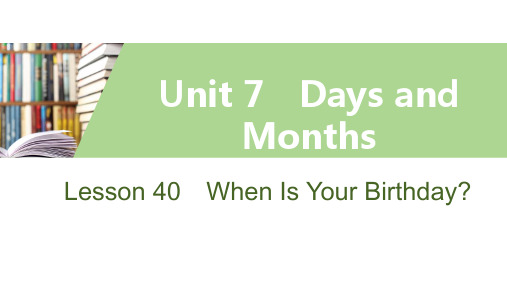
Lesson 40
(3)too作副词,意为“也;又;还”。一般用于肯定句,放在句 末,多用逗号与前面内容隔开。 (4)make sth. for sb.意为“为某人制作某物”,相当于make sb. sth.。 She wants to make her mother a birthday card. 她想给她妈妈制作一张生日卡片。
Lesson 40
[注意] (1)如果不是特别强调时间点或时间段,二者可以通用。 —When/What time do you go to school? 你什么时候去上学? —At 8:00 in the morning. 早上八点。 (2)在询问节日的时候,习惯上用when,而不用what time。 —When is Children's Day? 什么时候是儿童节? —It's on June 1. 6月1号。
Lesson 40
活学活用
The retired couple enjoy ____D____ photos. They always go out
with their camera.
A.take
B.took
C.to take D.taking
Lesson 40
[辨析] what time 与when (1)询问钟点时,用what time。 —What time is it now? 现在几点了? —It is two o'clock.两点了。 (2)询问日期、月份或年份时,用when。 —When did you go to Beijing?你什么时候去的北京? —Last month.上个月。
Lesson 40
7. 第九[naɪnθ] ___n_in_t_h__ 8.第十[tenθ] ___te_n_t_h__ 单 词 9.十月[ɒk'təʊbə] __O_c_to_b_e_r_ 闯 10.eleventh[ɪ'levnθ] __第_十__一___ 关 11.twelfth[twelfθ] __第_十__二___ 12.leap[liːp] _跳__;_跳__跃__
新概念二-Lesson40-课后练习
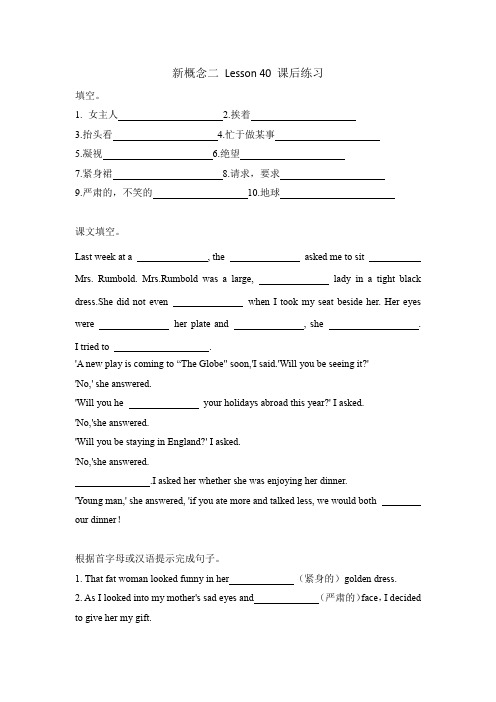
新概念二Lesson 40 课后练习填空。
1.女主人2.挨着3.抬头看4.忙于做某事5.凝视6.绝望7.紧身裙8.请求,要求9.严肃的,不笑的10.地球课文填空。
Last week at a , the asked me to sitMrs. Rumbold. Mrs.Rumbold was a large, lady in a tight black dress.She did not even when I took my seat beside her. Her eyes were her plate and , she .I tried to .'A new play is coming to “The Globe" soon,'I said.'Will you be seeing it?''No,' she answered.'Will you he your holidays abroad this year?' I asked.'No,'she answered.'Will you be staying in England?' I asked.'No,'she answered..I asked her whether she was enjoying her dinner.'Young man,' she answered, 'if you ate more and talked less, we would bothour dinner!根据首字母或汉语提示完成句子。
1. That fat woman looked funny in her (紧身的)golden dress.2. As I looked into my mother's sad eyes and (严肃的)face,I decided to give her my gift.3. When I entered,the man was f his thoughts on what he was doing so he didn't notice me.4.Look,she is having a quiet (谈话)with a friend over there.5. He came to miss his homeland when he settled down (国外).根据句意,用方框内所给单词或短语的适当形式填空。
lesson-40--Move-your--body的课件
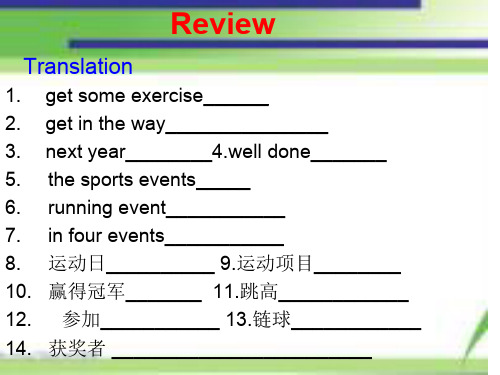
•10. She spends a lot of time _______ this papers. • A. in B. by C. for D. on • 11. He _ ___ too much _____in making the model. •A.takes/ time B. takes/materials C. spends/materials D. spends/ time
• 6.Don’t _w_o_r_r_y__a_b_o_u(t 担心)my health.
• 7.He _u_s_e__d_t_o_(过去常常)be fat, but now
he is thin
• 8.We’re _n__o_t_…lazy _a_n_y__m__o_r(e 不再).
I. Choose the right letter.
我妈妈总是担心我的学习。
•My mother is always worried about my study. •My mother always worries about my study.
• Every time the exam is over, I will __the result.
3.Eating too much meat will make us_p_u_t_o_n__w_e_ig_h(增t 加体重)。
4.Many people like to watch TV all day. They are
__c_o_u__ch__p_o_t_a_to_e_s___(沙发土豆).
Lesson40祈使句疑问句和进行时搭配
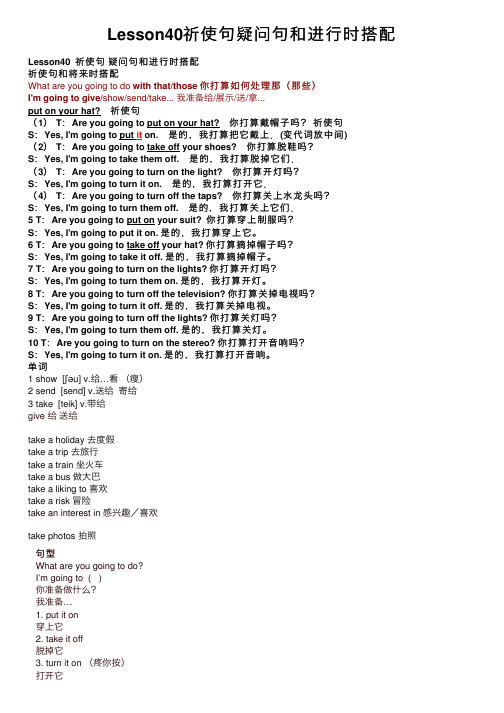
Lesson40祈使句疑问句和进⾏时搭配Lesson40 祈使句疑问句和进⾏时搭配Are you going to put on your hat? 你打算戴帽⼦吗?S:Yes, I'm going to put it on. 是的,我打算把它戴上.(变代词放中间)(2) T:Are you going to take off your shoes? 你打算脱鞋吗?S:Yes, I'm going to take them off. 是的,我打算脱掉它们.(3) T:Are you going to turn on the light? 你打算开灯吗?S:Yes, I'm going to turn it on. 是的,我打算打开它.(4) T:Are you going to turn off the taps? 你打算关上⽔龙头吗?S:Yes, I'm going to turn them off. 是的,我打算关上它们.5 T:Are you going to put on your suit? 你打算穿上制服吗?S:Yes, I'm going to put it on. 是的,我打算穿上它。
6 T:Are you going to take off your hat? 你打算摘掉帽⼦吗?S:Yes, I'm going to take it off. 是的,我打算摘掉帽⼦。
7 T:Are you going to turn on the lights? 你打算开灯吗?S:Yes, I'm going to turn them on. 是的,我打算开灯。
8 T:Are you going to turn off the television? 你打算关掉电视吗?S:Yes, I'm going to turn it off. 是的,我打算关掉电视。
Lesson40新概念英语第一册课后练习题答案
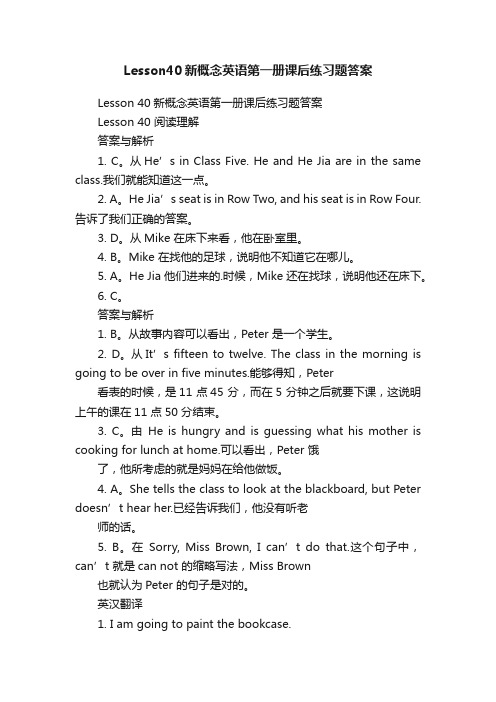
Lesson40新概念英语第一册课后练习题答案Lesson 40新概念英语第一册课后练习题答案Lesson 40 阅读理解答案与解析1. C。
从He’s in Class Five. He and He Jia are in the same class.我们就能知道这一点。
2. A。
He Jia’s seat is in Row Two, and his seat is in Row Four.告诉了我们正确的答案。
3. D。
从Mike 在床下来看,他在卧室里。
4. B。
Mike 在找他的足球,说明他不知道它在哪儿。
5. A。
He Jia 他们进来的.时候,Mike 还在找球,说明他还在床下。
6. C。
答案与解析1. B。
从故事内容可以看出,Peter 是一个学生。
2. D。
从It’s fifteen to twelve. The class in the morning is going to be over in five minutes.能够得知,Peter看表的时候,是11 点45 分,而在5 分钟之后就要下课,这说明上午的课在11 点50 分结束。
3. C。
由He is hungry and is guessing what his mother is cooking for lunch at home.可以看出,Peter 饿了,他所考虑的就是妈妈在给他做饭。
4. A。
She tells the class to look at the blackboard, but Peter doesn’t hear her.已经告诉我们,他没有听老师的话。
5. B。
在Sorry, Miss Brown, I can’t do that.这个句子中,can’t 就是can not 的缩略写法,Miss Brown也就认为Peter 的句子是对的。
英汉翻译1. I am going to paint the bookcase.2. I am going to send some flowers to my teacher.3. I am going to buy some ice creams for children.4. Mother is going to do some shopping tomorrow.5. What are you doing after finishing the homework?6. Put on your coat【Lesson 40新概念英语第一册课后练习题答案】。
Lesson40课文原文翻译(中英对照)及重点知识冀教版英语九年级全册
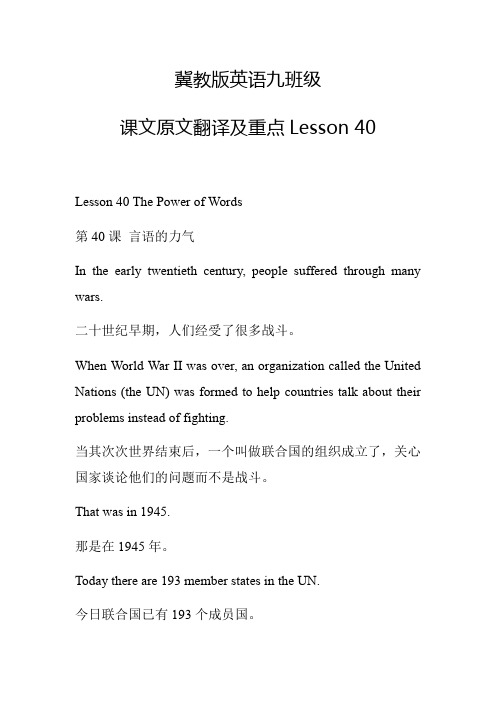
冀教版英语九班级课文原文翻译及重点Lesson 40Lesson 40 The Power of Words第40课言语的力气In the early twentieth century, people suffered through many wars.二十世纪早期,人们经受了很多战斗。
When World War II was over, an organization called the United Nations (the UN) was formed to help countries talk about their problems instead of fighting.当其次次世界结束后,一个叫做联合国的组织成立了,关心国家谈论他们的问题而不是战斗。
That was in 1945.那是在1945年。
Today there are 193 member states in the UN.今日联合国已有193个成员国。
The headquarters of the UN is in New York City.总部位于纽约。
The head of the UN, chosen by all the member states, is called the SecretaryGeneral.UN的领导,由全部成员国推选出来,被称作总秘书。
The UN Security Council has fifteen members,联合国平安理事会有十五个成员国,five of which are permanent members China, France, Russia, the U.K. and the U.S.五个常任理事国——中国、法国、俄国、英国及。
Many times since 1945, the UN has sent armies to keep peace between two fighting countries.1945年之后,很屡次联合国派维护两站战乱国之间的和平。
新概念三册Lesson40精品PPT课件

❖ deception n.欺骗 ❖ deceive ❖ 【辨】 ❖ deceit 强调一个人对另一个的故意欺骗
❖ self-respecting adj.自重的 ❖ self-表示“自...”: ❖ self-abuse 自责,自虐 ❖ self-abandonment ❖ 自暴自弃
❖ Text:
❖ (L1) It has never been explained why university students seem to enjoy practical jokes more than anyone else.
❖ (L1) university student 大学生 ❖ 相关词汇:
❖ How did the police and the workmen react? …grateful to …
police
two workmen
politely asked the workmen to go away
give a rude reply
threatened to remove them by force
❖ without permission 未经许可 ❖ -Parents always told us not to take
other's things without permission when we were young. ❖ ask sb. for permission 寻求许可 ❖ give/grant sb. permission 给与许可
Two workmen using a pneumatic drill outside his university
新概念英语第三册Lesson40一43课文注释

【导语】新概念三册是让学⽣进⼀步扩充和讲解词汇、短语及语法的实际运⽤。
分析句⼦及句⼦间的逻辑关系,仿照经典句⼦结构进⾏模仿性写作,以能够将所学的知识灵活地运⽤于英语写作和⼝语表达中。
以下是整理的新概念英语第三册Lesson40⼀43课⽂注释,欢迎阅读!1.新概念英语第三册Lesson40课⽂注释 Notes on the text课⽂注释 1 It has never been explained why...,在这个句⼦中真正的主语是以why引导的主语从句。
2 specialize in,专门从事。
3 inviting ... fire,是动名词短语,此处作主语,put out作“扑灭”、“熄灭”讲。
4 dress up as,装扮成。
5 they were not to take him seriously,(他们)不要把他当回事。
take此处作“对待”、“接受”讲,多指对⼈、对事物的态度和反应。
6 grateful to the student for this piece of advance information,对这个学⽣事先通报情况表⽰感谢。
be grateful to sb. for sth.,对某⼈因某事表⽰感谢。
7 as he pleased,是⽅式状语从句,后⾯省略了to do,可译作“随他的便”。
8 be under arrest,被逮捕,拘禁。
9 Only when…did he realize that...。
在这句话中,only加上状语从句放在句⾸,因此主句的主谓语要⽤倒装的句式。
2.新概念英语第三册Lesson41课⽂注释 Notes on the text课⽂注释 1 city born and city bred,城⾥⽣城⾥长。
这是由“名词+过去分词”构成的合成形容词,此处作原因状语。
2 go into raptures,变得欣喜若狂起来。
新概念英语第二册课件Lesson40(共16页)
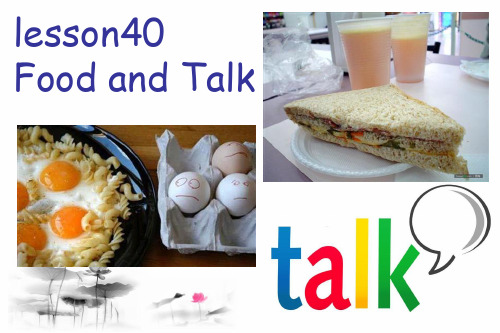
a) Houses b) Chewing c) Obese d) Etiquette(礼仪)
D
5) "Exactly" is a synonym(同义) for:
a) I owe you one b) You're wrong
c) You hit the nail on the head (一针见血) d) I really don't owe you one
C
Eating Etiquette (A)进餐礼节
•1) Never eat too quickly. Take your time. The slower yoቤተ መጻሕፍቲ ባይዱ eat, the more polite you seem.
•2) Never rest your elbows on the table when you eat. That is considered uncultured or rude.
Sausages
•colloquially(用白话) known as "bangers"(香肠) •distinctive(与众不同的) in that they are usually made from fresh meats and rarely smoked, dried, or strongly flavoured(被调味). • Following the post World War II period, sausages tended to contain low-quality meat, fat, and rusk.
Now listen to the story and answer the following question : Was Mrs.Rumbold a good companion at dinner?
新概念第二册课文翻译及知识点【Lesson40、41、42】
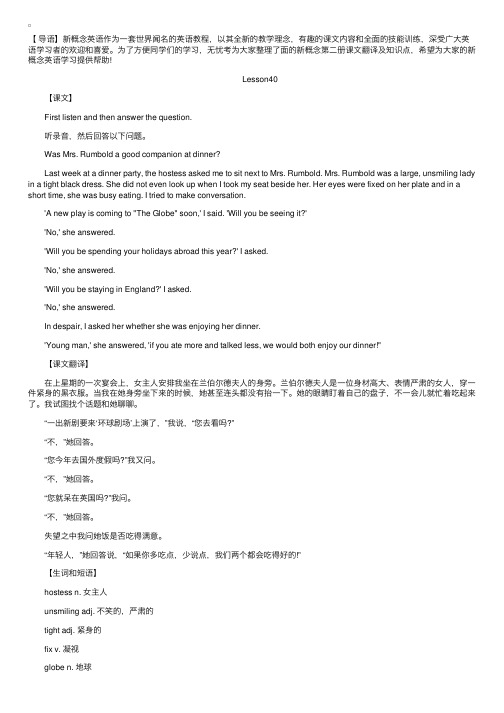
【导语】新概念英语作为⼀套世界闻名的英语教程,以其全新的教学理念,有趣的课⽂内容和全⾯的技能训练,深受⼴⼤英语学习者的欢迎和喜爱。
为了⽅便同学们的学习,⽆忧考为⼤家整理了⾯的新概念第⼆册课⽂翻译及知识点,希望为⼤家的新概念英语学习提供帮助!Lesson40 【课⽂】 First listen and then answer the question. 听录⾳,然后回答以下问题。
Was Mrs. Rumbold a good companion at dinner? Last week at a dinner party, the hostess asked me to sit next to Mrs. Rumbold. Mrs. Rumbold was a large, unsmiling lady in a tight black dress. She did not even look up when I took my seat beside her. Her eyes were fixed on her plate and in a short time, she was busy eating. I tried to make conversation. 'A new play is coming to "The Globe" soon,' I said. 'Will you be seeing it?' 'No,' she answered. 'Will you be spending your holidays abroad this year?' I asked. 'No,' she answered. 'Will you be staying in England?' I asked. 'No,' she answered. In despair, I asked her whether she was enjoying her dinner. 'Young man,' she answered, 'if you ate more and talked less, we would both enjoy our dinner!" 【课⽂翻译】 在上星期的⼀次宴会上,⼥主⼈安排我坐在兰伯尔德夫⼈的⾝旁。
Lesson 40课件 冀教版英语七年级下册
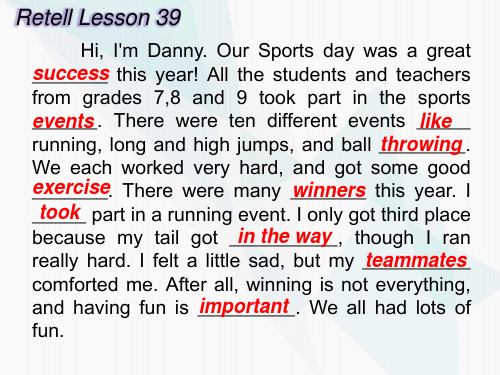
3.Tim is not active any more.
active adj.积极的 actively adv. 积极地 activity n.活动
➢ 他是我们班里一个积极的学生。
He is an active student in our class.
➢ 因为他总是积极地回答问题和参加许多不同的活动。
get to 到达
get back 回来 =arrive in /at=reach
get along/ on well with sb.与...和睦相处
8. air 空气 • 让我们出去并且呼吸新鲜空气吧。
Let's get out and breathe the fresh air.
➢ air n.天空,空中 He threw the ball high in the air. 在空中 It’s nice to play in the open air. 在户外 I will go to Beijing by air next week.
many computer games. ( F) 3.Ben and Tim are both putting on weight. (F ) 4.Tim finds a letter at his desk. ( F) 5.Ben and Tim will meet and go for a good walk.
Retell Lesson 39
Hi, I'm Danny. Our Sports day was a great _su__c_c_e_s_s this year! All the students and teachers from grades 7,8 and 9 took part in the sports _ev_e_n__ts_. There were ten different events _li_k_e__ running, long and high jumps, and ball _th_r_o_w_i_n_g_. We each worked very hard, and got some good _ex_e_r_c_i_s_e. There were many _w_i_n_n_e_rs_ this year. I _t_o_o_k_ part in a running event. I only got third place because my tail got _i_n_t_h_e_w__a_y_, though I ran really hard. I felt a little sad, but my _te_a_m__m__a_te_s_ comforted me. After all, winning is not everything, and having fun is _im__p_o_r_ta_n_t_. We all had lots of fun.
新概念英语 第二册 Lesson 40课文讲解
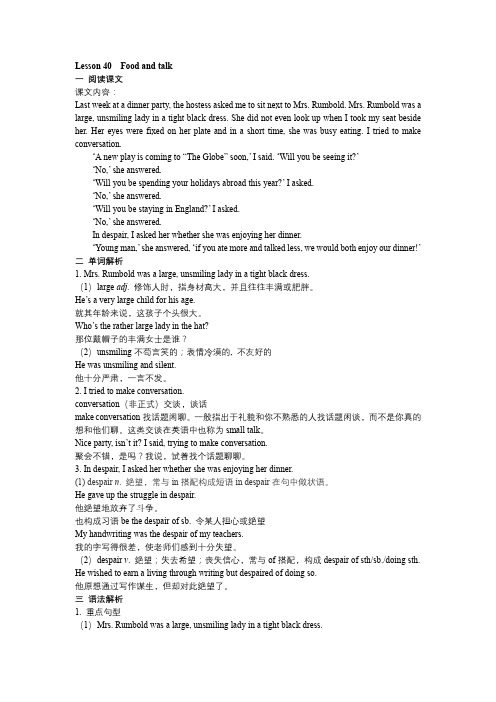
Lesson 40 Food and talk一阅读课文课文内容:Last week at a dinner party, the hostess asked me to sit next to Mrs. Rumbold. Mrs. Rumbold was a large, unsmiling lady in a tight black dress. She did not even look up when I took my seat beside her. Her eyes were fixed on her plate and in a short time, she was busy eating. I tried to make conversation.‘A new play is coming to “The Globe” soon,’ I said. ‘Will you be seeing it?’‘No,’ she answered.‘Will you be spending your holidays abroad this year?’ I asked.‘No,’ she answered.‘Will you be staying in England?’ I asked.‘No,’ she answered.In despair, I asked her whether she was enjoying her dinner.‘Young man,’ she answered, ‘if you ate more and talked less, we would both enjoy our dinner!’二单词解析1. Mrs. Rumbold was a large, unsmiling lady in a tight black dress.(1)large adj. 修饰人时,指身材高大,并且往往丰满或肥胖。
- 1、下载文档前请自行甄别文档内容的完整性,平台不提供额外的编辑、内容补充、找答案等附加服务。
- 2、"仅部分预览"的文档,不可在线预览部分如存在完整性等问题,可反馈申请退款(可完整预览的文档不适用该条件!)。
- 3、如文档侵犯您的权益,请联系客服反馈,我们会尽快为您处理(人工客服工作时间:9:00-18:30)。
New words and expressions 生词和短语
hoax
n. 骗局,戏弄
deception
n. 欺骗,骗局
self-respecting
adj. 自重的
indulge
v. 使沉迷
pneumatic
When a student recently saw two workmen using a pneumatic drill outside his university, he immediately telephoned the police and informed them that two students dressed up as workmen were tearing up the road with a pneumatic drill. As soon as he had hung up, he went over to the workmen and told them that if a policeman ordered them to go away, they were not take him seriously. He added that a student had dressed up as a policeman and was playing all sorts of silly jokes on people. Both the police and the workmen were grateful to the student for this piece of advance information.
最近有个学生看见两个工人在学校门外用风钻干活,马上打电话报告警察,说有两个学生装扮成工人,正在用风钻破坏路面。挂上电话后,他又马上来到工人那儿,告诉他们若有个警察来让他们走开,不要把他当回事,还对工人说,有个学生常装扮成警察无聊地同别人开玩笑。警察与工人都对那个学生事先通报情况表示感谢。
那个学生躲在附近一拱形的门廊里,在那儿可以看见、听到现场发生的一切。果然,警察来了,不礼貌地请工人离开此地;但其中一个工人粗鲁地回了几句。于是警察威胁要强行使他们离开。工人说,悉听尊便。警察去打电话叫人。一会儿工夫,又来了4个警察,规劝工人离开。由于工人拒绝停下手中的活,警察想夺风钻。两个工人奋力抗争,其中一个发了火,威胁说要去叫警察。警察听后讥讽地说,这大可不必,因为他俩已被逮捕了。其中一个工人装模作样地问道,在被带往警察局之前,是否可以打一个电话。警察同意了,陪他来到一个投币地电话前,当他看到那个工人真的是给警察挂电话,才恍然大悟,原来他们都成一场骗局的受害者。
It has never been explained why university students seem to enjoy practical jokes more than else. Students specialize in a particular type of practical joke: the hoax. Inviting the fire brigade to put out a nonexistent fire is a crude form of deception which no self-respecting student would ever indulge in. Students often create amusing situations which are funny to everyone except the victims.
Lesson 40
Who's who
真假难辨
Listen to the tape then answer the question below.
听录音,然后回答以下问题。
How did the policeman discover that the whole thing was a joke?
The student did in an archway nearby where he could watch and hear everything that went on. Sure enough, a policeman arrived on the scene and politely asked the workmen to go away. When he received a very rude reply from one of the workmen. He threatened to remove them by force. The workmen told him to do as he pleased and the policeman telephoned for help. Shortly afterwards, four more policemen arrived and remonstrated with the workmen. As the men refused to stop working, the police attempted to seize the pneumatic drill. The workmen struggled fiercely and one of them lost his temper. He threatened to call the police. At this, the police pointed out ironically that this would hardly be necessary as the men were already under arrest. Pretending to speak seriously, one of the workmen asked if he might make a telephone call before being taken to the station. Permission was granted and a policeman accompanied him to a pay phone. Only when he saw that the man was actually telephoning the police did he realize that they had all been the victims of a hoax.
adv. 讽刺地
permission
n. 许可
grant
v. 同意,准予
参考译文
谁也弄不清为什么大学生好像比任何人都更喜欢恶作剧。大学生擅长一种特殊的恶作剧——戏弄人。请消防队来扑灭一场根本没有的大火是一种低级骗局,有自尊心的大学生决不会去做。大学生们常常做的是制造一种可笑的局面,使大家笑上一场,当然受害者是笑不出来的。
adj. 气动的
drill
n. 钻
silly
adj. 无意义的,无聊的
advance
adj. 预先的,事
remonstrate
v. 规劝,告诫
ironically
